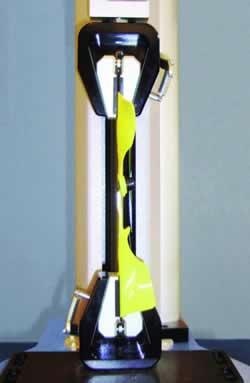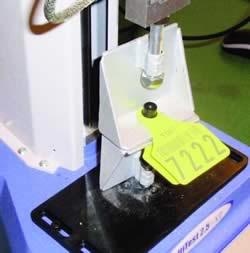In Denmark, the Danish Cattle Federation, together with its commercial arm RYK, is responsible for recording dairy cattle data in 98% of herds.
It works in close association with the International Committee on Animal Recording (ICAR) and the need arose for improved quality testing of the tensile strength of identification ear tags. These tags consist of a tamper-proof pin fastener between two flexible plastic leaves.
The requirement to test to ISO 37 and ISO 527-1 standards would need greater sophistication, because earlier tags were tested by merely hanging weights. In both transverse and axial pull tests, there would be a need to hold the tags under load and control the speed of the applied force. Additionally, the procedure must ensure that the tags, once opened, would break and become unusable.
Solution
Mecmesin supplied a MultiTest 2.5-xt console-controlled test stand with wedge grips, for the transverse pull test, in order to tear the two leaves apart from their ends. For pulling along the axis of the connecting pin, custom slotted grips were adapted from the earlier test design.
Mecmesin Emperor™ software helps run tests in stages, for instance, being held in tension at specific loads prior to being pulled more to breaking point and run at a required speed of 500 mm/min. These tests are easy to program and the reporting and measuring functions provide comprehensive test profiles.

Transverse pull test
System
- Custom grips specifically designed for animal ear tags
- 5 kN wedge grips
- MultiTest 2.5-xt (Superseded by OmniTest Touch 2.5)

Custom grips pull the pin apart axially
Testimonial
We were seeking a solution to improve repeatability, precision and documentation of our tests and also to automate our tests of the break force of plastic ear tags.
We found an excellent solution with the MultiTest 2.5-xt equipment, providing not only precise measurements but also being easy to programme and having good software to produce test reports. We received excellent service from the supplier.
Ole Klejs Hansen, Senior Advisor, RYK/Danish Cattle Federation

This information has been sourced, reviewed and adapted from materials provided by Mecmesin.
For more information on this source, please visit Mecmesin.